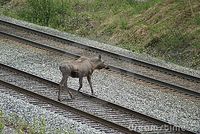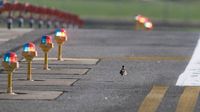Habitualization is just a big fancy word for
creating habits based on stimulation in your environment.
One of the best examples children learn
is of a dog who, when he heard a bell would come running because he
knew that the bell mean food. Zookeepers do this all the time to get
their charges to do simple things that help with veterinary check
ups.
Another example from my own life is
train horns. I grew up in the same house all my life. This house is
situated a little over 20 meters from the closest train tracks. All
day and night there are trains coming and going.
 As all conductors
As all conductors
are required to blow these horns anytime they come to roads that
cross streets there is a lot of noise . Yet I do not hear it ,
sometimes I am even shocked to realize that a train is passing and I
never heard it coming. I have been habituated to this sound so much
that when I am inside my home my brain does not hear the train.
However, when I am driving or walking I hear it very clearly. (Picture from Dreamstime.Com.)
This is all down to how my brain works
and helps me live my life safely and effectively. Over time, my brain
has learned that there is no danger to me from a train when I am at
home. Therefore jolting me when the sound of the train comes makes no
sense, nor is it necessary to my survival. In contrast, when I am
outside of this house, the sound of the train is important to my
survival and I am likely to look around to find it before continuing
on my way.
All animals, humans included, are
geared to find the best food for the least amount of energy. When
they find a good,stable and reliable source of food, they stay
nearby. They set up house and move in. However, if this great area of
food, water, and shelter is near humans that might be a problem.
Birds are especially problematic when
they decide that airports are great places to live. While the sound
of the engines can cause them to scatter in the beginning, after a
while the birds learn to ignore them, like I do train horns. What we
know today as bird strikes then start to occur more frequently
because the birds fly too close to planes.
 Airports (like this one in Oregon) try to manage this by using
Airports (like this one in Oregon) try to manage this by using
lots of techniques to scare off the flying menaces, but they do not
always work all the time. From sound, to uncomfortable vibrations,
even bringing in predators to scare them off if the area looks good
to live – they will always come back. It gets to a point that if
the airport uses the same technique all the time, the birds will just
ignore it.
It sometimes reminds me of humans who
live in known natural disaster areas. Like those who decide Florida
is a great place to live, even with the hurricanes. Or that nowhere
in America can beat California, even if they have earthquakes every
day. The one bright spot it seems are those who live in tornado
allye, they at least know what they are getting themselves into. Yet,
even now there are still people who live in these areas of the
country.
You have to know the risks as well as
the rewards for living in a particular area.
Wildlife, in general, seems to
understand this as well. They know that the risk to their health and
survival is there. To try and combat this they will work harder at
getting their genes onto the next generation. Consequently that
generation is less affected by the noise than the last one because
they have been habituated to it from the beginning.
So what can be done? Change the habitat
of the area so that it does not present itself to be this golden
opportunity for wildlife. Give them a reason not to be there, that they would be better off somewhere else.
It reminds me of what a family friend
told me earlier this summer. His aunt always had a perfect garden
while her neighbors had deer coming by and eating everything. When
she was asked what her secret was, she said simply, “I only get
plants that the deer hates.”
NOTE: Robin, a 2013 graduate of Texas A&M Kingsville in range and wildlife sciences, is presently looking for work in urban wildlife policy. Got a Clue for her? Write.










